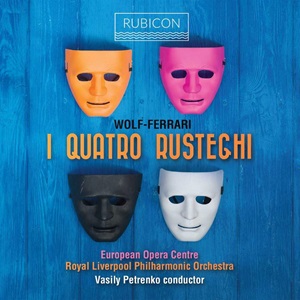
Ermanno Wolf-Ferrari (1876-1948)
I quatro rusteghi (1906).
Mihnea Lamatic (bass): Lunardo, a merchant; Silvia Beltrami (mezzo-soprano): Margarita, his second wife; Romina Casucci (soprano): Lucieta, his daughter by his first wife; Mirko Quarello (bass): Simone, a merchant; Daniela Degennaro (soprano): Marina, his wife; Aleksandar Stefanoski (bass): Maurizio, a merchant; Tansel Akzeybek (tenor): Filipeto, his son and Marina’s nephew; Roman Ialcic (bass): Cancian, a merchant; Ana James (soprano): Felice, his wife; Giulio Pelligra (tenor): Count Riccardo Arcola, a gentleman of Florence; Agnieszka Hauzer (soprano): maid to Marina;
Royal Liverpool Philharmonic Orchestra/Vasily Petrenko
rec. live 20-30 March (rehearsals) & 31 March (performance), Liverpool Philharmonic Hall
Italian libretto and English translation available on the website
Rubicon RCD1024 [2 CDs: 131]
In 2020, Mike Parr very favourably reviewed a live recording of the original German language version of this opera on the CPO label from Munich in 2014, and back in 2002 Colin Clarke reviewed a 1953 mono recording of the version on Cetra in Italian – actually, mostly in Venetian dialect, hence there is only one t in “quatro” and only the aristocrat Count Riccardo sings in classical Italian – but this composite recording of a live, staged concert performance from a decade ago appears to have been overlooked; re-listening to, and enjoying, Wolf-Ferrari’s most popular work, I gioielli della Madonna, prompted me to investigate it.
Given that Wolf-Ferrari had a German father and an Italian mother, the question of which language the opera should be heard in hardly applies, in that both influences are apparent: it was the second of his so-called “Venetian” operas but described by the composer as a “Musikalisches Lustspiel” (musical comedy) and premiered in German in Munich in 1906 as Die vier Grobiane (The Four Churls) – mainly because Wolf-Ferrari had a German publisher; on the other hand, it is based on an abridged adaptation of Goldoni’s 1760 play in Italian – but the Italian premiere of the work was not heard until 1920. In short, however, just as I gioielli first saw the light of day as Der Schmuck der Madonna, I quatro rusteghi has a dual life. In any case, it seems to work in either language, as my two fellow-reviewers attest. Its title is commonly translated into English as “The Four Father” or “The Four Codgers” – although I prefer “Curmudgeons” as a more apt translation and the Rubicon website even suggests “The Four Old Gits”!
Whereas I gioielli della Madonna is high-voltage verismo with lots of violence and conflict, having quite a lot in common with works such as Cavalleria rusticana, the plot of I quatro rusteghi is much gentler – standard opera buffa fare, involving arranged marriages, disguise and cross-dressing, and the triumph of a young love almost thwarted by the older generation. Mike Parr suggests that its lightness and mercurial wit ally it more closely with Verdi’s Falstaff in style and content, but without the bitter-sweet melancholy of the aging Fat Knight, just “frothy fun and banter”. Having said that, the men and women speak very nastily to each other and no-one will come away from this opera convinced that either the older generation or marriage itself is ideal; it is really quite cynical in its depiction of the married state – but I suppose we shouldn’t take it too seriously and I guess you have to laugh at a wife who says of another’s husband “Appreciate him; mine’s more like a pig than many others.” (Actually “dog” in the Venetian dialect, but let’s not cavil.) Nonetheless, some of the dialogue is really quite shocking to a modern sensibility, especially at the beginning of Act III when the husbands talk about how to punish the women by destroying them, tearing their heads off, beating, strangling, starving, chaining them to a cellar wall – I’m not sure it’s that funny…and the dénouement is weirdly anticlimactic and prosaic; the men suddenly collapse and it’s all over in a trice.
Regarding the voices assembled here, none strikes me as being of any great distinction – the basses are gruff and growly and there is a prevalence of excessive vibrato, especially among the women. By far the best of the female singers is New Zealand-born soprano Ana James – and as Felice she has some of the most appealing music. Tansel Akzeybek has one of those rather “wet and weedy” tenors; Giulio Pelligra is a tad better but they are both of the same uninspiring tenorial voice type. Romina Casucci’s soprano has a “pulsing”, whining quality which makes her sound unsteady and I find disconcerting, although she makes every effort to characterise Lucieta vividly. There is still much to enjoy; there is very nice ensemble for vocal quartet at the end of Act I Scene VIII and the Intermezzo waltz is charming; in fact, fleeting waltz melodies are a recurrent feature of the score. Many of the women’s ensembles are indeed very reminiscent of Verdi’s Falstaff, as they plot to counteract their husband’s machinations, and the timing of those quickfire exchanges is admirable.
The sound is fine but there is some faint ambient rustle in the background throughout.
I have reviewed the CD set but it may also be streamed. The Italian libretto and English translation are available at www.rubiconclassics.com; scroll down to the release and click on the release information. According to the notes, the English translation “is based on the surtitles used for the live performance and not intended to be a precise translation from the Venetian dialect.”
This is certainly a recording for those who like to discover something off the beaten track but neither the music nor the singing really captivates me, and I hardly thirst to hear it again, even if I particularly admire the delicacy of Petrenko’s direction and his orchestra’s playing.
Ralph Moore
Help us financially by purchasing from



















